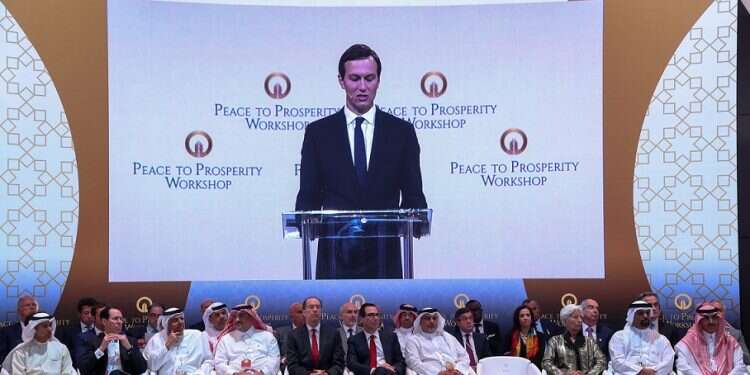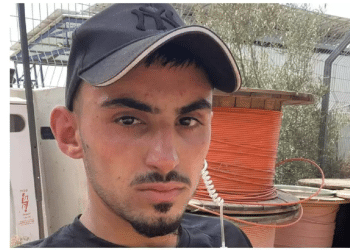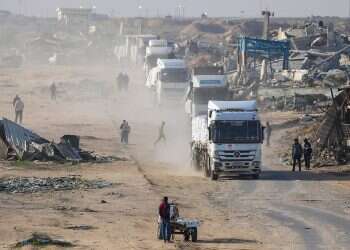US President Donald Trump's son-in-law and senior adviser, Jared Kushner, appealed Tuesday for the Palestinians to consider a $50 billion economic support plan, even though they already rejected the proposal because it does not include a political resolution to the long-running conflict with the Israelis.
Kushner, speaking at a conference in Bahrain, defended the proposal as the foundation of any eventual peace plan. Meanwhile, Palestinians protested the plan in the streets of the West Bank, Gaza and elsewhere.
Follow Israel Hayom on Facebook and Twitter
The president's son-in-law sought to defend his long-anticipated plan at the start of a two-day workshop aimed at building support for a program to combine private investment and support from regional governments to transform economically challenged Palestinian communities.
"One who is more hopeful and sees an opportunity for his or her family will put energy into pursuing opportunity, instead of blaming others for their current misfortune," Kushner said. "That is why agreeing on an economic pathway forward is a necessary precondition to what has previously been an unsolvable political situation."
"My direct message to the Palestinians is that despite what those who have let you down in the past have told you, President Trump and America has not given up on you," Kushner said. "This workshop is for you, and if this is executed correctly, it will lead to a better future for the Palestinian people: a future of dignity, prosperity and opportunity."
He continued: "What we have developed is the most comprehensive economic plan ever created specifically for the Palestinians and the broader Middle East… We can turn this region from a victim of past conflicts into a model for commerce and advancement throughout the world.
"To be clear, economic growth and prosperity for the Palestinian people are not possible without an enduring and fair political solution to the conflict ... one that guarantees Israel's security and respects the dignity of the Palestinian people… "However, today is not about the political issues. We will get to those at the right time," he said.
Kushner's audience in the tiny Gulf kingdom did not include any official Palestinian delegation. Israel, which will have to sign off on many of the proposal's projects, did not send any government officials, either. Those who heard Kushner in person were Arab finance ministers, the heads of international financial organizations and global business executives and investors.
While the representation was broad, many countries' delegations were not headed by cabinet ministers, an indication of their uncertainty about the proposal's viability.
The Palestinians have rejected the proposal – which aims in 10 years to create a million new jobs, slash unemployment and improve living standards in the West Bank, Gaza and across the Middle East – because it does not include a horizon for granting independence. US officials say the political portion of the plan addressing such thorny issues may not be released until fall.
Kushner acknowledged that a political solution is crucial to the success of the economic proposal. He said it was more important to first set out what is economically possible.
"Agreeing on an economic pathway forward is a necessary precondition to resolving what has been a previously unsolvable political situation," he said.
Trump boiled it down to even simpler terms: "We have to get economic support because the Palestinians don't have money, and we have to help the Palestinians with some money," he told reporters at the White House.
But, without proposals on borders, the status of Jerusalem and the fate of Palestinian refugees, the Palestinians say the economic plan is meaningless. To express their rejection, Palestinians in Gaza called a general strike on Tuesday to protest the meeting, with demonstrators in the West Bank burning effigies of Trump and featuring a donkey pasted over with images of Gulf royals.
"Palestine is not for sale!" protesters chanted. "From Bahrain to Saudi Arabia, we are not tempted by your millions!"
Besides opposition from the intended beneficiaries of the proposal, the plan has been criticized by former diplomats, aid workers and others involved in past peacemaking efforts for being unrealistic and lacking any clear description of who will pay for it.
Trump, Kushner and US Treasury Secretary Steven Mnuchin argue that a new approach is needed precisely because previous efforts have fallen short. They note that the heads of the International Monetary Fund and the World Bank will attend and speak at the event, as will the head of FIFA, the international soccer federation, and the managers of numerous large investment funds.
The Palestinians wrote to FIFA chief Gianni Infantino on Tuesday urging him to reconsider his participation.
"How can the president of the highest governing body of football, and the most outspoken person on the importance of separating politics from sports, agree to participate in a political workshop whose objective is to determine the future of Palestine in the absence of Palestinians?" the letter said.
Enthusiasm has also been tempered by the Trump administration's refusal to endorse the creation of a Palestinian state in the West Bank, Gaza and east Jerusalem, the "two-state solution" that has long been viewed internationally as the only viable path to lasting peace.
Even the Arab delegations attending the meeting in Bahrain have couched their participation with reaffirmations of support for an eventual Palestinian state.
Saudi Arabia, one of the few Arab countries to send its foreign minister to the event, said it remained committed to that end with a state based on the border that existed before the 1967 Six-Day War.
Egypt and Jordan, the only Arab nations to have signed peace deals with Israel, are sending only midlevel representatives to Bahrain and said they would not abandon demands for a Palestinian state.
At a ceremony hosted by Israel's president to mark 40 years of Egyptian-Israeli peace on Tuesday, Egypt's ambassador to Israel, Khaled Azmi, said his country's "vision was, and still is, based on full nation-statehood and security for everyone in the region."
Bahrain, which has close ties to the Saudis, has been criticized for hosting the conference and sharply limited the number of journalists allowed to cover it. It has defended its decision by saying its only objective is to support the "brotherly Palestinian people."
Although Bahrain has cracked down on dissent, Bahraini opposition voices protested the meeting on social media, particularly on Twitter, where Arabic hashtags about the workshop were trending under banners "Down with Bahrain conference" and "Down with the Deal of Shame."




